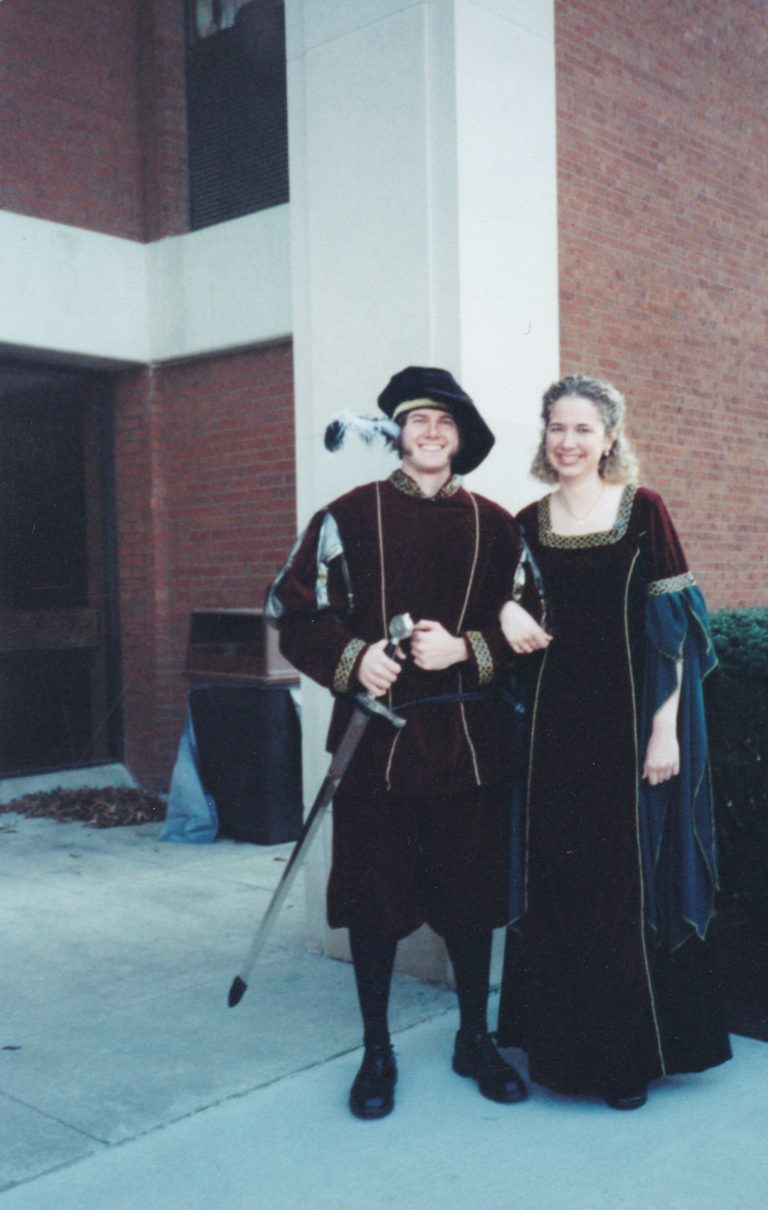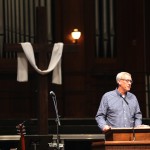By Jana Wiersema, Features Editor
If you’re a member of the Visionary or Merciful class, you’re probably deep in preparation for Junior-Senior — finding just the right outfit, planning your route and ride and, worst-case scenario, maybe even scrambling to get your hands on a ticket. You’ve probably saved the date in your calendar already — March 1 at 7 p.m. at the Eagle Lake Convention Center in Lawrenceburg, Kentucky — and made a mental or literal note of every spa treatment and makeup tutorial you need to get ready.
Now imagine what it would be like if, on top of all of that, you also had to memorize musical numbers and dramatic scenes of dialogue — and you’ve got a pretty good picture of what Junior-Senior used to be like until the mid-2000s.
While Junior-Senior has always been a celebration of the senior class, it wasn’t always a dance. For many years, the event was a banquet where the junior class would typically put on a dinner theatre show (or, in some cases, a musical cabaret) for the seniors. According to the university’s archives, Asbury’s first recorded Junior-Senior took place in 1938, and the theme was “A Twilight Fantasy.” The 1948 Junior-Senior appears to be the first one where students performed a repertoire from a broadway musical — in this case, it was “I Remember Mama.”
One document from 1988 gives very specific guidelines regarding the Junior-Senior production, which was to be “given as a gift from the Junior Class to the Senior Class and invited guests.” These guidelines stated that:
- The student directors and class advisors had to choose the production by October 1 and get approval from the vice president of Student Development by October 15.
- The event was to have a “conservative budget” not exceeding $7,000.
- Auditions were to be held in the last two weeks of the fall quarter, and the auditioning committee included student directors and class advisors.
- No one on academic probation could participate in the production. Students with major roles had to have a minimum GPA of 2.5; students with smaller parts had to have a minimum of 2.0.
Furthermore, while many Junior-Senior productions were of Broadway shows, some were original student creations. For example, the 2001 Junior-Senior, “On the Air,” was written and performed by students and held at the Grand Rotunda of the Cincinnati Museum Center. An email reminder about the event invited students to “experience the thrill of being part of the audience of a live 1930s radio show.”
“You will be dazzled by the singers, dancers and actors that filled homes across the country during the golden age of radio,” said the invitation. “We’ll also be enjoying the tunes of one of the best Big Bands in the area.”
The last record of a theatrical Junior-Senior production comes from a 2002 invitation to “Knight of Chivalry.” While it’s unclear if the years following the 2002 event still featured musical and dramatic acts, one thing is certain: The biggest change came in 2011, when the event became a dance.
In January of 2011, a Collegian article announced that community standards had been extended to include “Asbury special celebratory occasions,” including Junior-Senior, as an exemption to Asbury’s policy against social dancing (as long as the dancing at the event remained “wholesome”).
A lot has changed since the days of Junior-Senior dinner theatre. The venues are still classy and elegant, but tickets, which were $35 in 2001, are now $15. The budget, which was $7,000 in 1988, is now $10,000, according to Haleigh Davis, president of the junior class cabinet.
Davis said that students can expect “heavy hors d’oeuvres” catered from popular venues such as Chick-fil-A and North Lime and “a nice throwback with ‘Beauty and the Beast’ inspired decorations,” as a reference to the Merciful class’s sophomore musical.
“The best part of planning Junior-Senior has been to see the excitement of the Visionary Cabinet in planning this event,” Davis said. “I have really enjoyed turning the visions and dreams of the cabinet into a real event.”
She added that planning for the event began this past summer and accelerated “when we came back to school and started to solidify hopes and dreams for the event as well as more concrete logistics like a venue.” She also noted that Junior-Senior is “an all-hands-on-deck event” that wouldn’t be possible without the talent and expertise of every cabinet member.
81 years of Junior-Senior. Much has changed, but one thing remains the same: a dedication to honoring the seniors.
“Many of [the seniors] helped us transition into college,” Davis said, “and they have been the ones we looked up to as we go through our college career. It will be different next year with them not being on campus, and Junior-Senior is a great way to commemorate them and all they have done during their time at Asbury.”




